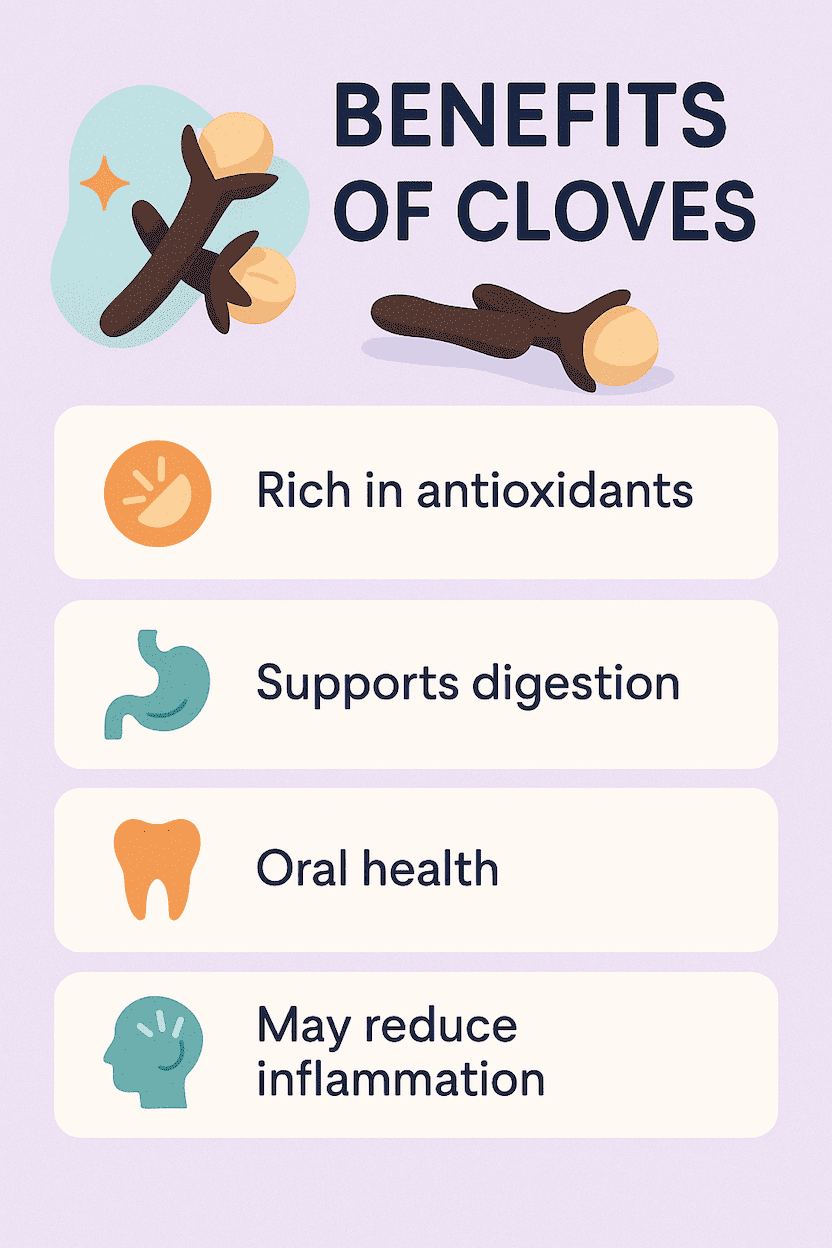Last update: November 5, 2025
8 minute read
Cloves Benefits: Powerful Antioxidant and Anti-Inflammatory Uses
Curious why cloves show up in everything from toothpaste to supplement blends? We break down the science behind their antioxidant power and real-world health applications.

By Derick Rodriguez, Associate Editor
Edited by Yerain Abreu, M.S.

You've probably seen those little brown nail-shaped things stuck in a holiday ham. Or maybe you've noticed "clove oil" on your toothpaste label. But here's what most people don't know: cloves pack more antioxidants than almost any other spice you can buy.
We're not talking about vague "wellness" claims. There's actual research on specific compounds in cloves that help reduce inflammation and protect your cells. So what makes this tiny flower bud so special? And should you care about the clove extract showing up in supplements?
Key takeaways
- Eugenol (the main active ingredient in cloves) works like a natural painkiller and fights inflammation
- Cloves have one of the highest antioxidant scores of any food, which helps protect your body from daily cell damage
- Supplement forms vary a lot in strength, so knowing what you're buying matters
What are cloves?
Cloves are the dried flower buds of the Syzygium aromaticum tree, a plant native to Indonesia but now grown in countries like India, Sri Lanka, and Madagascar. Each bud is harvested before it blooms, which is why it keeps that distinct “nail” shape.
While most people know cloves as a baking spice or holiday flavor, traditional medicine systems like Ayurveda and Chinese medicine have used them for centuries, mainly for tooth pain, digestive issues, and infections.
Modern supplement companies use concentrated extracts, not the kitchen spice, because the active compound eugenol is most potent in oil form, not ground powder.

The antioxidant power in cloves (and why it matters)
Think of antioxidants as your body's cleanup crew. Every day, your cells produce waste products called free radicals.
They come from normal stuff like:
- Breaking down food for energy
- Breathing in pollution
- Exercise (yes, even healthy activities create them)
- Stress and poor sleep
Free radicals damage cells if they stick around too long. Antioxidants neutralize them before they cause problems.
Scientists measure antioxidant strength using something called an ORAC score. Here's how cloves compare:
Food/Spice | ORAC Score (per 100g) |
|---|---|
Cloves | 290,000 |
Cinnamon | 131,000 |
Turmeric | 127,000 |
Ginger | 28,000 |
Blueberries | 4,600 |
Spinach | 1,500 |
That gap is huge. Even a small amount of cloves delivers serious antioxidant action.
The main player here is eugenol, a compound that makes up 70-90% of clove oil. But eugenol doesn't just clean up free radicals. It also tells your body to calm down inflammation at the source.
VitaRx Tip
No single antioxidant does everything. Your body works best with variety, so eat different colorful foods and spices throughout the week.
What eugenol actually does (in plain English)
Eugenol is the reason cloves work for so many things. Here's what happens when it gets into your system:
For pain relief:
- Blocks pain signals by interacting with nerve endings
- Creates a numbing sensation (which is why dentists have used it for decades)
- Works differently than regular painkillers like ibuprofen, but gets similar results
For inflammation:
- Blocks an enzyme called COX-2 (the same target as drugs like Advil)
- Reduces inflammatory signals your immune system sends out
- Helps break the cycle of chronic, low-level inflammation
For fighting bacteria:
- Damages bacterial cell walls
- Works against strains that cause mouth infections and digestive issues
- This is why you see it in natural toothpaste and mouthwash
One thing to know: Most studies use concentrated forms of eugenol. Sprinkling a pinch of ground cloves on your food is great for general health, but won't give you therapeutic doses.
That's where supplements come in.
Different forms of cloves (and how to use them)
Not all clove products are created equal. Here's what you'll find:
1. Whole or ground cloves (from the spice aisle)
- Best for: Cooking and general antioxidant benefits
- Eugenol content: Low to moderate
- How to use: Add to recipes, teas, or coffee
- Reality check: You'd need several tablespoons daily to hit therapeutic levels (which would taste awful)
2. Clove essential oil
- Best for: Topical use (diluted) or specific dental products
- Eugenol content: Very high (70-90%)
- How to use: ALWAYS dilute before using. Never swallow it straight
- Safety note: Pure essential oil can burn your mouth or skin
3. Clove extract (in capsules)
- Best for: Consistent daily dosing for anti-inflammatory support
- Eugenol content: Usually standardized to 15-85%
- How to use: Follow bottle directions, typically 50-200mg daily
- What to look for: Third-party testing (NSF, USP, or ConsumerLab seals)
4. Clove in combination supplements
- Best for: People using multiple natural anti-inflammatories
- Common pairings: Turmeric, ginger, black pepper extract
- Why combined: Different compounds work through different pathways
VitaRx Tip
Take clove supplements with a meal that has some fat in it (avocado, nuts, olive oil). Eugenol absorbs better when fat is present.
Real ways people use cloves (backed by research)
Oral health and dental pain
- The claim: Cloves numb toothaches and fight mouth bacteria
- The science: A 2012 study found clove gel worked as well as benzocaine (the stuff in Orajel)
Practical uses:
- Temporary relief for toothaches (until you see a dentist)
- Mouthwashes that reduce plaque buildup
- Natural ingredient in toothpaste for antimicrobial action
Blood sugar support
- The claim: Eugenol helps cells respond better to insulin
- The science: Several animal studies and a few small human trials show promise
What we know:
- May improve how your body processes glucose
- Reduces inflammation that interferes with insulin
- Still early research, but diabetic supplement brands are interested
Digestive comfort
- The claim: Cloves help with bloating, gas, and nausea
- The science: Traditional use is strong, modern research is limited
Possible mechanisms:
- Relaxes intestinal muscles
- Antimicrobial effects might balance gut bacteria
- Not as well-studied as ginger or peppermint, but mechanically sound
Joint and muscle discomfort
- The claim: Anti-inflammatory properties help with aches and arthritis
- The science: Small trials with topical clove formulations show modest benefits
How it might work:
- COX-2 inhibition (like NSAIDs, but natural)
- Reduces inflammatory chemical signals
- More research needed, but the basic science checks out
Who should be careful with clove supplements
Cloves in food are safe for almost everyone. But concentrated supplements need caution in these situations:
Blood thinners or upcoming surgery:
- Eugenol affects blood clotting
- Could increase bleeding risk when combined with medications like warfarin
- Stop taking supplements at least 2 weeks before any surgery
Pregnancy and breastfeeding:
- Cooking amounts are fine
- High-dose supplements haven't been tested for safety
- Some traditional medicine used it to induce labor (which is why doctors say avoid supplements)
Liver conditions:
- Very high doses over long periods affected liver function in animal studies
- Stick to recommended ranges
- If you have existing liver issues, check with your doctor first
Allergies:
- If clove oil irritates your skin, be careful with internal use
- Allergic reactions are rare but possible
How cloves compare to other natural anti-inflammatories
Supplement | Main Active Compound | Best Known For | Typical Daily Dose |
|---|---|---|---|
Cloves | Eugenol | Pain relief, antioxidants | 50-200mg extract |
Turmeric | Curcumin | Joint inflammation | 500-2000mg extract |
Ginger | Gingerols | Nausea, digestion | 250-1000mg extract |
Cinnamon | Cinnamaldehyde | Blood sugar support | 120-500mg extract |
Green Tea | EGCG | Metabolism, heart health | 200-400mg EGCG |
Each one works differently in your body. That's why you'll see combination supplements with several of these together. They cover more bases than any single ingredient could.
VitaRx Tip
Start with a lower dose when trying any new supplement. Give it 2-3 weeks before deciding if it works for you. Keep notes on what you notice.
Frequently asked questions (FAQ)
Here are some of the most frequently asked questions about cloves.
Final thoughts
Cloves are pretty amazing, offering a powerful combo of food and medicine with noticeable effects and a good safety record. Modern science is really backing up what people have used them for traditionally, and it's showing us how they actually work.
Your body deals with inflammation and cell damage constantly as part of being alive. Sometimes you need serious medical help, other times you want gentler tools that support your body's natural balance, and cloves can be one of those tools.
Cooking with cloves is effective, but supplements offer concentrated effects. Understand your choices, as true health comes from consistent good decisions.
Sources and references
Editor

Derick Rodriguez
Derick Rodriguez focuses on editing health and wellness-related content. With over half a decade of experience in the digital realm, Derick has developed a unique skill set that bridges the gap between complex health concepts and accessible, user-friendly communication. His approach is deeply rooted in leveraging personal experiences and insights to illuminate the nuances of health and wellness topics, making them more approachable and empowering readers with knowledge and confidence.
Editor

Yerain Abreu
Yerain Abreu is a content strategist with over seven years of experience. He earned a Master's degree in digital marketing from Zicklin School of Business. He focuses on medical and health-related content, working with top healthcare professionals to ensure content is engaging and reliable.
At VitaRx, we're not just passionate about our work — we take immense pride in it. Our dedicated team of writers diligently follows strict editorial standards, ensuring that every piece of content we publish is accurate, current, and highly valuable. We don't just strive for quality; we aim for excellence.
Related posts
While you're at it, here are some other relevant articles you might be interested in.

Get your personalized vitamin recommendations in less than
5 minutes.
Get your personalized vitamin recommendations in less than
5 minutes.






